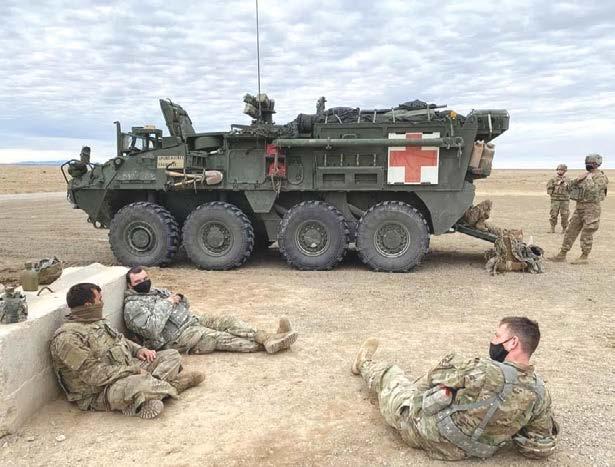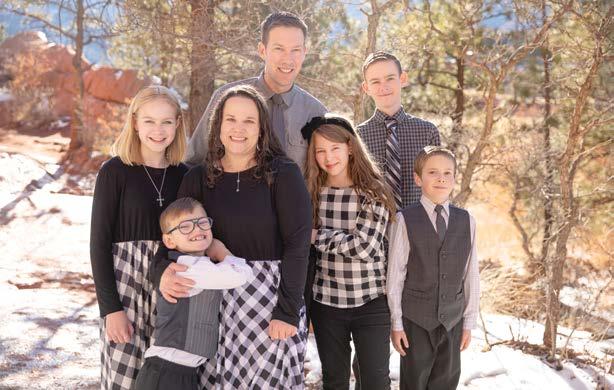
7 minute read
Ministry in the Military: An Interview with Army Chaplain Byron Denman
The CGGC has an interesting and tumultuous history with the armed forces of the United States. At the outset, John Winebrenner was rather against war and even called civil wars “sinful,” saying that “saints of the Most High ought never to participate.” Yet, Winebrenner and many of the early CGGC leaders were staunch abolitionists, and when the American Civil War broke out, Winebrenner’s pacifism became less popular within the church for quite understandable reasons. Many felt that that the war was a regrettable, but ultimately necessary way to bring about their abolitionist aims.
To this day, the CGGC doesn’t have a clear and guiding principle about war or the military like Winebrenner did. But one thing is clear, the CGGC has chosen to support and sponsor military chaplains who might be ambassadors for Christ, extending His love, care, and sacrifice even to places the church might not otherwise dare to tread. The GLC is fortunate to have an Army chaplain of its very own. Chaplain Byron Denman is a licensed pastor of the GLC and served as pastor at Hopewell First Church of God for a while before moving into full time chaplaincy. We’ve had the pleasure to ask Chaplain Denman a number of questions about his role, and the impact God is making through him.
Can you give us a brief background of your work with the Great Lakes Conference, and how you moved into Chaplaincy?
I was raised an Army child, and then served as an enlisted soldier for 10 years. I felt early on that God was calling me to bridge the gap between my passion for developing soldiers and ministering to His people. So, I started with an understanding that I was called to be an Army chaplain and then developed a relationship with the Great Lakes Conference as I pursued seminary and chaplaincy. I was connected with the GLC while I was serving in Germany in 2012. I had called Dr. Earl Mills in order to discuss becoming an Army chaplain through the GLC. While I was in seminary, I was licensed by the GLC, served two years as an associate pastor and church planter out of Hopewell First Church of God in Tiffin, and then was called up to resume Active Duty in 2019.
You’ve served in both traditional ministry and military chaplaincy. What are the core differences between these two ministries?
Where soldiers are in their faith journey is very different from what you would see in the typical church congregation. They come into the Army with wildly diverse upbringings that have formed their worldviews. Many soldiers who profess faith do not actually know what the Bible says about sin, grace, and salvation. Some are strong believers and some are ambivalent or even antagonistic about faith. I provide support and training through all sorts of problems and situations, hoping that those who do not know Christ might come to understand his love for them through the ministry he has set before me. The challenge in this is that I am not permitted to proselytize. I have to present the Gospel as my personal beliefs without doing anything that could be perceived as pushing those beliefs onto others. It really shifts into a gentler evangelism than what you see from a civilian pulpit.
What is your ‘congregation’ like? Is the demographic similar to most of our churches, or different?
As a chaplain, I have two main duties. Primarily, I am assigned a battalion of soldiers, usually 500-700 people, for whom I provide support, counseling, and training. This includes unique things like marriage and single soldier retreats, suicide awareness training, and ethical training for leadership. I provide regular worship services and Bible studies to these soldiers while deployed. The chaplain also serves as a liaison between the soldiers and the unit leadership. Secondarily, I serve alongside other chaplains providing chapel services on post. This includes everything a traditional (civilian) pastor would do. The congregation typically consists of believers from a variety of protestant denominations and across generations, as young soldiers and retired Army personnel.
Based on your experience in the military chaplaincy, what unique issues are young men and women in the military facing?
Soldiers today, especially the younger generation, are lacking connection on a deep level. I see this with the high numbers of suicidal ideation, as well as an overall sense of searching and loss. A vast majority of our soldiers are looking for purpose in their lives. That is why they join the military: they want to be a part of something bigger. They want to be included in something that matters. I also see many soldiers who lack a sense of personal identity. The responsibility of the church is to provide an environment that offers the connection, purpose, and hope that is found at the cross of Christ. When we do that well, we will meet the needs of those soldiers who are hurting the most. Many of them, however, do not realize the extent of these spiritual needs. My position as a chaplain allows me to open them up to this reality and share with them the answer that we all know Jesus is.
Most of our pastors don’t have to regularly serve people of different faith traditions. What is that like?
As a chaplain, one of my duties is to make sure that soldiers of every faith have their religious accommodations met. This includes making sure they are provided special meals (specifically for Jewish or Muslim soldiers) and that they have access to religious services. I do not provide services to different faith groups, but I will ensure that they have their sacred text available to them. This gives me a unique opportunity to reach people and forge relationships that most pastors don’t have the opportunity to do. I am confident that people who are genuinely seeking the truth will find it in the love of Jesus, so that is what I am to provide, regardless of their starting faith or lack thereof.
Where have you seen God active in your ministry?
Several soldiers have come to understand the grace of Christ and accepted Him as their Savior. I’ve seen soldiers step up to lead Christian groups and Bible studies. One young man in particular went from an infantry soldier to transition into ministry. He’s currently in the process of becoming a religious affairs specialist, which is an enlisted position that serves alongside Chaplains, with the goal of eventually going to seminary to become a Chaplain himself. On a heavier note, I’ve talked at least five soldiers away from the cliff of suicide by offering them the peace of God, and getting them the help they needed. My phone is on 24/7 so that these people can reach me in their direst need.
How can the Great Lakes Conference or the CGGC at large support your ministry?
My family has received tremendous support over the past few years. The prayers that have covered us, the phone calls or text messages to see how we are doing, and the fellowship of GLC/CGGC pastors when we have been able to connect have all given us assurance that we are not navigating the Army chaplaincy alone. I have also had excellent guidance and professional mentoring from CGGC leaders who have taken me underwing. Continued support in all of these ways is everything that we desire, and we are confident that it will endure.








